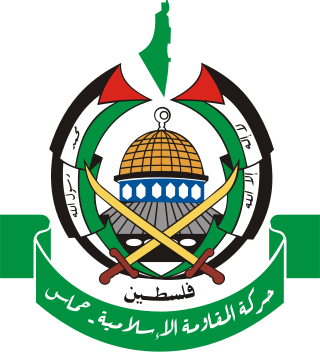
The Islamic Resistance Movement, abbreviated Hamas, is a Palestinian nationalist Sunni Islamist political organisation with a military wing called the Ezzedeen Al-Qassam Brigades. It has governed the Israeli-occupied Gaza Strip since 2007.
This timeline of the Israeli–Palestinian conflict lists events from 1948 to the present. The Israeli–Palestinian conflict emerged from intercommunal conflict in Mandatory Palestine between Palestinian Jews and Arabs, often described as the background to the Israeli–Palestinian conflict. The conflict in its modern phase evolved since the declaration of the State of Israel on May 14, 1948 and consequent intervention of Arab armies on behalf of the Palestinian Arabs.
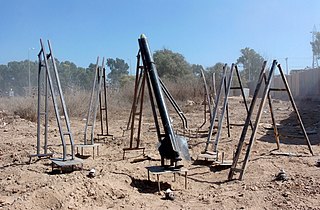
The Qassam rocket is a simple, steel artillery rocket developed and deployed by the Izz ad-Din al-Qassam Brigades, the military arm of Hamas. These rockets cannot be fired to target specific military objectives in or near civilian areas, and are "indiscriminate when used against targets in population centers".

Palestinian political violence refers to actions carried out by Palestinians with the intent to achieve political objectives that can involve the use of force, some of which are considered acts of terrorism, and often carried out in the context of the Israeli–Palestinian conflict. Common objectives of political violence by Palestinian groups include self-determination in and sovereignty over all of Palestine, or the recognition of a Palestinian state inside the 1967 borders. This includes the objective of ending the Israeli occupation. More limited goals include the release of Palestinian prisoners held by Israel and recognition of the Palestinian right of return.

The al-Quds 101 Rocket is a homemade artillery rocket made and used by the Palestinian Islamic Jihad for use in attacks against Israel. The al-Quds 101 is most likely similar to the Qassam rocket series used by Hamas.

The Arab–Israeli conflict is the phenomenon involving political tension, military conflicts, and other disputes between various Arab countries and Israel, which escalated during the 20th century. The roots of the Arab–Israeli conflict have been attributed to the support by Arab League member countries for the Palestinians, a fellow League member, in the ongoing Israeli–Palestinian conflict; this in turn has been attributed to the simultaneous rise of Zionism and Arab nationalism towards the end of the 19th century, though the two national movements had not clashed until the 1920s.
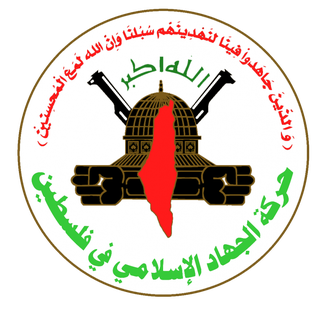
The Islamic Jihad Movement in Palestine, commonly known simply as Palestinian Islamic Jihad (PIJ), is a Palestinian Islamist paramilitary organization formed in 1981.

In 2008, Israel sought to halt the rocket and mortar fire from Gaza that killed four Israeli civilians that year and caused widespread trauma and disruption of life in Israeli towns and villages close to the Gaza border. In addition, Israel insisted that any deal include an end to Hamas's military buildup in Gaza, and movement toward the release of Corporal Gilad Shalit. Hamas wanted an end to the frequent Israeli military strikes and incursions into Gaza, and an easing of the economic blockade that Israel has imposed since Hamas took over the area in 2007.

The Gaza–Israel conflict is a localized part of the Israeli–Palestinian conflict beginning in 1948, when 200,000 Palestinians fled or were expelled from their homes, settling in the Gaza Strip as refugees. Since then, Israel has been involved in about 15 wars involving organizations in the Gaza Strip. The number of Gazans reportedly killed in the ongoing 2023–2024 war (37,000) is higher than the death toll of all other wars of the Arab–Israeli conflict.

The Gaza War, also known as the First Gaza War, Operation Cast Lead, or the Gaza Massacre, and referred to as the Battle of al-Furqan by Hamas, was a three-week armed conflict between Gaza Strip Palestinian paramilitary groups and the Israel Defense Forces (IDF) that began on 27 December 2008 and ended on 18 January 2009 with a unilateral ceasefire. The conflict resulted in 1,166–1,417 Palestinian and 13 Israeli deaths. Over 46,000 homes were destroyed in Gaza, making more than 100,000 people homeless.

Since 2001, Palestinian militants have launched tens of thousands of rocket and mortar attacks on Israel from the Gaza Strip as part of the continuing Israeli–Palestinian conflict. The attacks, widely condemned for targeting civilians, have been described as terrorism by the United Nations, the European Union, and Israeli officials, and are defined as war crimes by human rights groups Amnesty International and Human Rights Watch. The international community considers indiscriminate attacks on civilian targets to be illegal under international law. Palestinian militants say rocket attacks are a response to Israel's blockade of Gaza, but the Palestinian Authority has condemned them and says rocket attacks undermine peace.
The following is a list of military operations of the Israeli–Palestinian conflict.
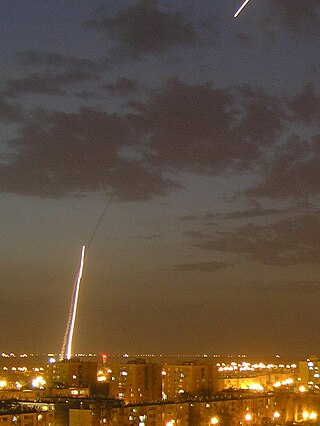
In November 2012, the Israel Defense Forces (IDF) launched Operation Pillar of Defense, which was an eight-day campaign in the Hamas-governed Gaza Strip, beginning on 14 November 2012 with the killing of Ahmed Jabari, chief of the Gaza military wing of Hamas, by an Israeli airstrike.

The 2014 Gaza War, also known as Operation Protective Edge, and Battle of the Withered Grain, was a military operation launched by Israel on 8 July 2014 in the Gaza Strip, a Palestinian territory that has been governed by Hamas since 2007. Following the kidnapping and murder of three Israeli teenagers in the West Bank by Hamas-affiliated Palestinian militants, the Israel Defense Forces (IDF) initiated Operation Brother's Keeper, in which it killed 10 Palestinians, injured 130 and imprisoned more than 600. Hamas reportedly did not retaliate but resumed rocket attacks on Israel more than two weeks later, following the killing of one of its militants by an Israeli airstrike on 29 June. This escalation triggered a seven-week-long conflict between the two sides, one of the deadliest outbreaks of open conflict between Israel and the Palestinians in decades. The combination of Palestinian rocket attacks and Israeli airstrikes resulted in over two thousand deaths, the vast majority of which were Gazan Palestinians. This includes a total of six Israeli civilians who were killed as a result of the conflict.
The Arab–Israeli war normally refers to:

A Gaza–Israel conflict escalation began on 3 May 2019 after two Israeli soldiers were injured by sniper fire from the Gaza Strip during the weekly protests at the Gaza–Israel border. In response, the Israeli Air Force carried out an airstrike, killing two Palestinians. Following this, hundreds of rockets were launched from Gaza at Israel, while the Israeli Air Force struck numerous targets within the Gaza Strip. In addition, Israel increased its troop presence near the Israel–Gaza barrier.
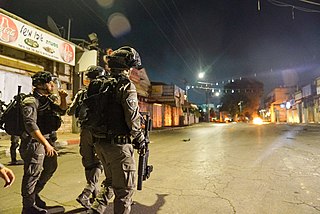
The 2021 Gaza War, sometimes called the Unity Intifada, was a major outbreak of violence in the Israeli–Palestinian conflict that mainly commenced on 10 May 2021, and continued until a ceasefire came into effect on 21 May. It was marked by protests and police riot control, rocket attacks on Israel by Hamas and Palestinian Islamic Jihad (PIJ), and Israeli airstrikes in the Gaza Strip. The crisis was triggered on 6 May, when Palestinians in East Jerusalem began protesting over an anticipated decision of the Supreme Court of Israel on the eviction of six Palestinian families in the East Jerusalem neighborhood of Sheikh Jarrah. Under international law, the area, effectively annexed by Israel in 1980, is a part of the Israeli-occupied West Bank; On 7 May, according to Israel's Channel 12, Palestinians threw stones at Israeli police forces, who then stormed the Al-Aqsa Mosque compound using tear gas, rubber bullets, and stun grenades. The crisis prompted protests around the world as well as official reactions from world leaders.













